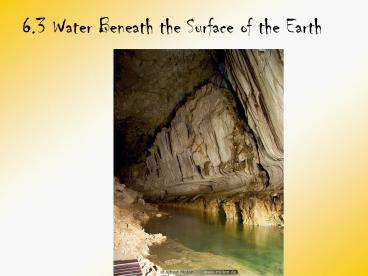6'3 Water Beneath the Surface of the Earth PowerPoint PPT Presentation
1 / 19
Title: 6'3 Water Beneath the Surface of the Earth
1
6.3 Water Beneath the Surface of the Earth
2
Cave Facts
- The world's deepest cave goes down 5,256 feet
(1,602 meters) and is located in Haute Savoie,
France. - Mammouth Cave in Kentucky is the world's longest
cave system, traveling for over 340 miles.
3
6.3 Water Beneath the Surface of the Earth
? Most water seeps downward into the zone of
saturation.
? Zone of saturation - where water fills all of
the open spaces.
4
? Movement
Porosity
- The percentage of pore spaces
- Determines how much groundwater can be stored
Permeability
- Ability to transmit water through connected pore
spaces - Soils with low permeability readily form ponds.
5
? A spring forms where the water table intersects
the ground surface.
6
Geyser Eruption Cycle
? Geysers
Intermittent hot springs
Water turns to steam and erupts.
7
? Well - hole bored into the zone of saturation.
Artesian well - groundwater rises on its own
under pressure.
8
Cone of Depression
A cone of depression may form around a well it
may eventually be left dry.
9
? Overuse and contamination threatens groundwater
supplies in some areas.
We should treat water as a nonrenewable
resource
10
Groundwater Contamination
Your neighbors house
Your House
The water traveled 100 meters before it reaches
the well, but it moves too quickly over the
limestone to be purified! Ugh!
As discharge from the septic tank permeates
through the permeable sandstone it is purified.
11
Dissolving of Groundwater Creates Caverns
- Cavern naturally formed underground chamber
- Groundwater erodes away rocks (usually) limestone
12
Dissolving of Groundwater Creates Caverns
Dripstone Features- form from dripping calcite
Stalactite (ceiling)
Stalagmite (floor)
13
What is the difference between a cave and a
cavern?
- Cave - any cavity in the ground large enough that
some portion of it will not receive direct
sunlight - Cavern - A type of cave with the ability to grow
dripstone features
14
Dissolving of Groundwater Creates Caverns
15
Who says there isnt anything to do in Indiana?
Looking for a roadtrip for you and your
friends?Be a Goonie
- Marengo Cave in Southern Indiana
- Walk through the caves
- Put on a helmet and explore the caves by crawling
through passages - Make a campfire and stay in their cabins
16
- The Discovery of Marengo Cave
- Blanche Heistand, age 15 and her brother Orris
Heistand, age 11 - September 6, 1883
- On September 6, 1883, fifteen-year-old Blanche
Hiestand, a cook at Marengo Academy, overheard
some of the schoolboys making plans to explore a
deep sinkhole located in a graveyard near the
school. - Blanche decided to beat them to it! She excitedly
ran home after work and recruited her
eleven-year-old brother, Orris. They grabbed some
candles and snuck out of the house. - Blanche and Orris quickly hiked up the hill past
the cemetery by the church. They found the
sinkhole, surrounded by a grove of trees, and
climbed to the bottom. - Together they Blanche and Orris crawled down the
steep, slippery slope. They found themselves in a
large chamber that appeared to continue in
several directions. They heard water falling and
saw formations in the distance. - Having only candles to light their path the pair
decided to turn back. - Blanche and Orris safely reached the top.
- The original land owner was notified of the
cave's discovery a few days later and the cave
was immediately opened to the public for tours.
17
? Formed by dissolving rock at, or near, Earth's
surface
? Common feature
Sinkholes form when bedrock dissolves and
caverns collapse.
18
Sinkhole Formation
19
(No Transcript)

